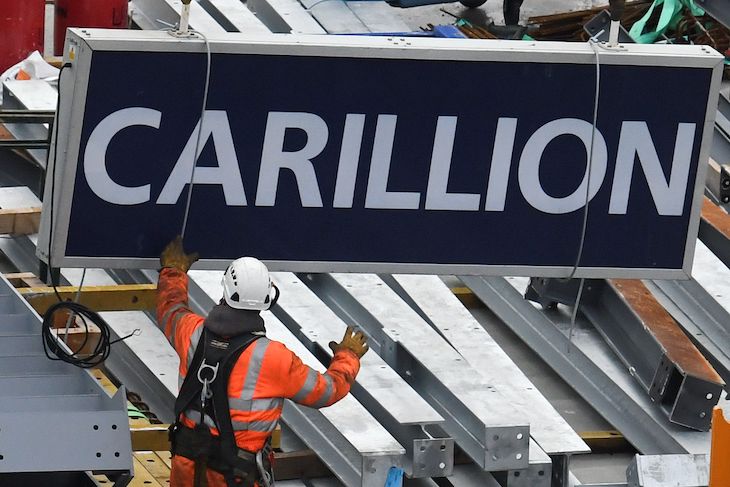The fallout from Carillion’s bankruptcy spreads in slow motion — just as the outsourcing and construction giant’s finances gradually stretched to breaking point over the months before it went down in January. The company’s auditor, KPMG, was rightly under the spotlight this week. But the impact on the ground seems to have been less disruptive than early reports predicted. Receivers have made 1,000 redundancies but have re-let many contracts, securing thousands of other jobs. Construction of the £335 million Royal Liverpool Hospital — one of the overrunning contracts that contributed to Carillion’s cash crisis — won’t now be completed this year, but outsourced services in many other places have been seamlessly reorganised.
The attention of politicians who regard outsourcing as Satan’s work has accordingly focused less on the plight of workers and service users and more on which set of capitalist lackeys to lambast: the overpaid bosses, the eye-off-the-ball accountants, the easy-lending bankers or the footloose shareholders. Among the last, the likes of Standard Life Aberdeen turned out to have been ‘fleeing for the hills’ well ahead of the crash, Labour MP Frank Field observed with asperity this week; MPs on the House of Commons Work and Pensions Committee he chairs aim to find out whether Carillion’s institutional investors had ‘complied with the Stewardship Code’.
That’s an interesting line of inquiry, but surely not a fruitful one. The Stewardship Code (promulgated by the Financial Reporting Council) makes clear that directors carry primary responsibility for companies’ ‘long-term success’ but that investors also have duties which include ‘monitoring and engaging… on matters such as strategy, performance, risk [and] capital structure’. Does that mean an investment manager who thinks a company in which he holds shares is going down has a duty to stick around and persuade its executives to change course, or a more pressing duty to sell as quickly as he can and protect his own clients’ savings?
Common sense says the latter — and the code itself makes clear that compliance ‘does not preclude a decision to sell a holding, where this is considered in the best interest of clients or beneficiaries’. So I doubt even an old warrior like Frank Field can make mileage out of that one.
As for the bankers, they had the same information to hand as the investors but carried on lending for fear, one assumes, of hastening a collapse if they cut off Carillion’s credit lines. Loan write-downs were expected to pass £1 billion this week, with RBS, Barclays, Santander, Handelsbanken and Lloyds already on the list; the City at large will be hit where it hurts most in coming weeks. ‘Not amused,’ emails one banker, ‘that Carillion write-off could have dire impact on bonus pool.’ Our hearts bleed.
After Oxfam
Some time ago I labelled Oxfam ‘the anti-capitalist lobby group which is also a part-time aid charity’: this column has repeatedly highlighted the fact that donors have unknowingly funded a hard-left think-tank (recent publisher of a list of ‘the eight people who own as much wealth as the poorest half of the world’) as well as a Third World relief operation that has now been tainted by allegations of sex abuse. I also objected to the plague of its 650 charity shops, cannibalising the trade of established small businesses in struggling high streets.
So I have scant sympathy for Oxfam’s embattled boss Mark Goldring. But I would not want the current witch hunt for disrespecters of women (and worse) to lead, as some wealth managers have predicted, to a fall-off in philanthropic giving. Britons donate almost £10 billion a year to good causes, and the fragile fabric of a society in which public funding is increasingly scarce depends upon us continuing to do so.
But if the result of the Oxfam scandal is to divert cash from big, smug, mismanaged multinational charities to smaller local projects that are easier to scrutinise and whose social impacts are more easily measured, then so much the better.
Deep fried
This week’s funniest parable of capitalism unravelling was the news that KFC had run out of chicken — or at least 550 of its 900 UK outlets had done so. In the way of the modern world, an immediate search began for someone to blame, and the finger of guilt swiftly pointed to DHL, the parcels business that took over KFC’s supply contract in November. DHL is owned by Deutsche Post, which is not only German and privatised but also a ruthless competitor to our own highly unionised Royal Mail, facts which no doubt prompted Mick Rix of the GMB union to weigh in by calling conditions at the DHL distribution centre ‘an utter shambles’. Meanwhile, let me be first to thank DHL, which promised to set ‘a new benchmark’ in sustainable fresh-produce delivery, for doing so by imposing a brief but healthy respite in Britain’s high-salt, deep-fried diet.
No option for Barclays
‘The Serious Fraud Office wants a word’ was a message that caused my past City life to flash before my eyes. But the prosecutor of corporate sin was calling to point out, in a courteous way, that my item on Barclays last week contained a misunderstanding of the way the law operates these days. Since Barclays has already been charged with ‘unlawful financial assistance’ and other offences in connection with its 2008 Qatari financing, the bank no longer has the option (as I suggested it did) to negotiate a new-fangled ‘deferred prosecution agreement’ which might incur a fine but avoid a courtroom drama. So we must wait to hear whether Barclays pleads guilty or not guilty; the next hearing is on 23 April, and the trial itself is scheduled for January next year. Either way, the bank’s standing in the eyes of customers and shareholders can only get worse before — and if ever — it gets better.






Comments